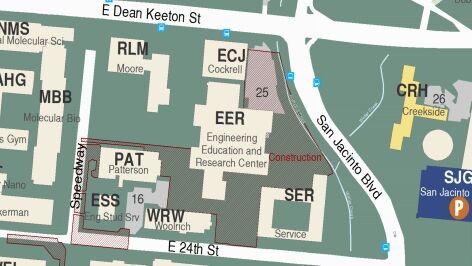Electrical and Computer Engineering
Major in the Cockrell School of Engineering

As an electrical engineer, you could develop components for some of the most fun things in our lives (MP3 players, digital cameras, or roller coasters) as well as the most essential (medical tests or communications systems).
As a computer engineer, you might work on robotics, computer networks, wireless communications, or biomedical devices - areas that are at the very forefront of technological innovation.
Freshman and External Transfer Admission
ShowProspective University of Texas at Austin students should visit UT Admissions to learn about the application process and how to declare a major.
Internal Transfer Requirements
ShowUndergraduates currently enrolled at The University of Texas at Austin who wish to change to an engineering major need to apply for an internal transfer. Find out more about the internal transfer process.
Required Courses
ShowFor more information on required courses, read the Electrical and Computer Engineering undergraduate curriculum overview.
Specializations
ShowWithin Electrical and Computer Engineering, there is one degree (BSEE) and two accredited programs (Electrical Engineering and Computer Engineering).
Electrical Engineering offers five technical cores
- Communications, Signal Processing, Network and Systems
- Electronics and Integrated Circuits
- Energy Systems and Renewable Energy
- Fields, Waves and Electromagnetic Systems
- Nanoelectronics and Nanotechnology
Computer Engineering offers three technical cores:
- Computer Architecture and Embedded Systems
- Software Engineering and Design
- Data Science and Information Processing
Personality
ShowEngineers are creative problem solvers who are essential to our health, happiness and safety. Engineering students celebrate discovery, design, creativity, imagination, innovation and contribution to the world we live in. No profession unleashes the spirit of innovation like engineering. From research to real-world applications, engineers constantly discover how to improve our lives by creating bold new solutions that connect science to life in unexpected, forward-thinking ways. Few professions turn so many ideas into so many realities. Few have such a direct and positive effect on people's everyday lives. We are counting on engineers and their imaginations to help us meet the needs of the 21st century.
Learn about the Cockrell School of Engineering Electrical and Computer Engineering Student Organizations.
Skills
ShowEngineering students will acquire creative problem solving skills and the ability to design and lead in a variety of situations and environments. Based on "The Engineer of 2020" by the National Academy of Engineering, the Cockrell School of Engineering strives to graduate students who:
- Possess strong analytical skills
- Exhibit practical ingenuity - skill in planning, combing and adapting
- Exhibit creativity - invention, innovation, thinking outside of the box
- Exhibit good communication skills
- Master the principles of business and management
- Understand and practice the principles of leadership
- Possess a framework upon which high ethical standards and a strong sense of professionalism can be developed
- Exhibit dynamism, agility, resilience, and flexibility
- Embrace being a lifelong learner
